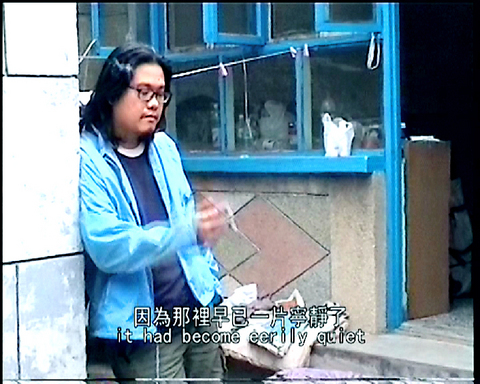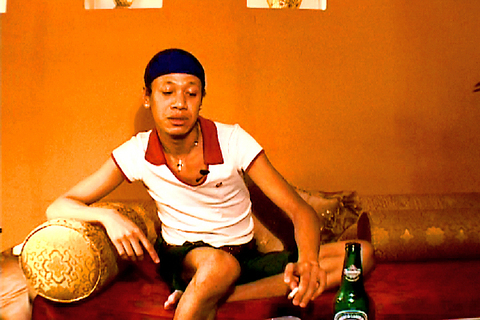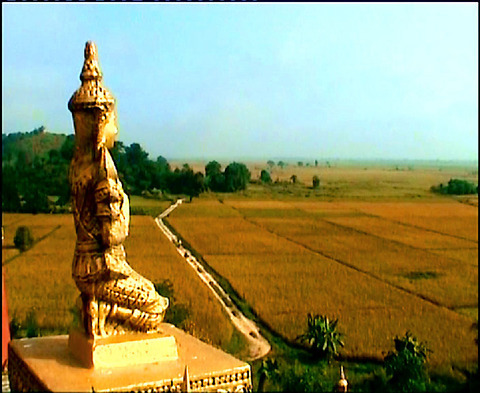If a weekend of imbibing alternative films and having a relaxed time quaffing beer with friends sounds intriguing, you need look no further than the Urban Nomad Film Fest (
Coming into its fifth year, the independent showcase presents a content-rich lineup of 40 works featuring surf and skateboard videos, short films, animations and documentaries made by underground talents from home and abroad.
Organized by the expat duo David Frazier and Sean Scanlan, Urban Nomad was set up with the aim of preserving underground creativity and demonstrating that the media is a democratic tool accessible to anyone who has something to say.

PHOTOS COURTESY OF URBAN NOMAD
"When people make films, they want the works to be seen. So we try to be more flexible about the deadline ... and screen as many of the submitted works as possible," co-founder Scanlan said.
As this year's focus is on alternative visions and documentaries, the festival offers an exciting mixture of works addressing political and social issues and subcultures from different regions, especially from the southeastern Asian countries including Singapore, Thailand, the Philippines and Malaysia.
One such film is Singapore Rebel. Banned in Singapore, the documentary is an emotionally-charged account of the political dissenter and opposition leader Chee Soon Juan, who, since 1992, has taken up the valiant mission to challenge the authoritarianism of the People's Action Party (PAP). He subsequently lost his job as a university professor, and was eventually forced into bankrupcy.

The film offers a rare chance for outsiders to see how the PAP uses oppressive methods to silence political opponents like Chee in the name of building a modern Asian society.
As co-founder and organizer Frazier said alternative film scenes in southeastern Asian countries have enjoyed strong growth in recent years. And as a young and growing alternative venue, Urban Nomad has reached out this year to fringe film festivals and curators in Thailand and the Philippines to bring out new underground voices.
"Ideally, we want Urban Nomad to become part of the underground network in Southeast Asia. Kids and young people in different places should understand each other through alternative media as opposed to big film festivals or dominant TV channels," Frazier said.

Representing the promising future of the local film community is Respire (
Highly stylish and poetically shot, the low-budget film is an inspiring example of how a work of art can be produced despite certain limitations. It was shot with old, sometimes even moldy, film rolls collected from commercial production houses in Taipei.
If you missed the opening film Surviving Beijing (

Idealistic and optimistic at first, the group settles down in the now bulldozed "Tree Village" in the suburb of Beijing, a legendary settlement of rock musicians and social drop-outs.
The film follows the failing attempts of the Malaysian rockers to get gigs and mingle with the tough crowds, and gives audiences an insight into the urban tribe of rockers who don't fit in to the fast-changing society and choose to live in poverty and make music as a social protest against China's rapid development toward capitalism.
For those who feel the three-hour-long programs of experimental film is just too much, there is a chill-out space for visitors to walk around, sip beer and enjoy a good chat with friends or strangers. At Urban Nomad, visitors will not find dark, confining theaters, but a film party where people are free to share their thoughts and feelings with other individuals.
Festival notes
What: Urban Nomad Film Fest (城市游牧影展)
Where: Huashan Cultural Center (華山文化園區), 1, Bade Rd Sec 1, Taipei (臺北市八德路一段1號)
When: Tonight beginning at 7:30pm; tomorrow and Sunday at 7pm.
Tickets: NT$200 for one day; NT$500 for a four-day festival pass.
For more information on films to be screened, visit www.urbannomadfilmfest.blogspot.com

April 14 to April 20 In March 1947, Sising Katadrepan urged the government to drop the “high mountain people” (高山族) designation for Indigenous Taiwanese and refer to them as “Taiwan people” (台灣族). He considered the term derogatory, arguing that it made them sound like animals. The Taiwan Provincial Government agreed to stop using the term, stating that Indigenous Taiwanese suffered all sorts of discrimination and oppression under the Japanese and were forced to live in the mountains as outsiders to society. Now, under the new regime, they would be seen as equals, thus they should be henceforth

Last week, the the National Immigration Agency (NIA) told the legislature that more than 10,000 naturalized Taiwanese citizens from the People’s Republic of China (PRC) risked having their citizenship revoked if they failed to provide proof that they had renounced their Chinese household registration within the next three months. Renunciation is required under the Act Governing Relations Between the People of the Taiwan Area and the Mainland Area (臺灣地區與大陸地區人民關係條例), as amended in 2004, though it was only a legal requirement after 2000. Prior to that, it had been only an administrative requirement since the Nationality Act (國籍法) was established in

With over 80 works on display, this is Louise Bourgeois’ first solo show in Taiwan. Visitors are invited to traverse her world of love and hate, vengeance and acceptance, trauma and reconciliation. Dominating the entrance, the nine-foot-tall Crouching Spider (2003) greets visitors. The creature looms behind the glass facade, symbolic protector and gatekeeper to the intimate journey ahead. Bourgeois, best known for her giant spider sculptures, is one of the most influential artist of the twentieth century. Blending vulnerability and defiance through themes of sexuality, trauma and identity, her work reshaped the landscape of contemporary art with fearless honesty. “People are influenced by

The remains of this Japanese-era trail designed to protect the camphor industry make for a scenic day-hike, a fascinating overnight hike or a challenging multi-day adventure Maolin District (茂林) in Kaohsiung is well known for beautiful roadside scenery, waterfalls, the annual butterfly migration and indigenous culture. A lesser known but worthwhile destination here lies along the very top of the valley: the Liugui Security Path (六龜警備道). This relic of the Japanese era once isolated the Maolin valley from the outside world but now serves to draw tourists in. The path originally ran for about 50km, but not all of this trail is still easily walkable. The nicest section for a simple day hike is the heavily trafficked southern section above Maolin and Wanshan (萬山) villages. Remains of